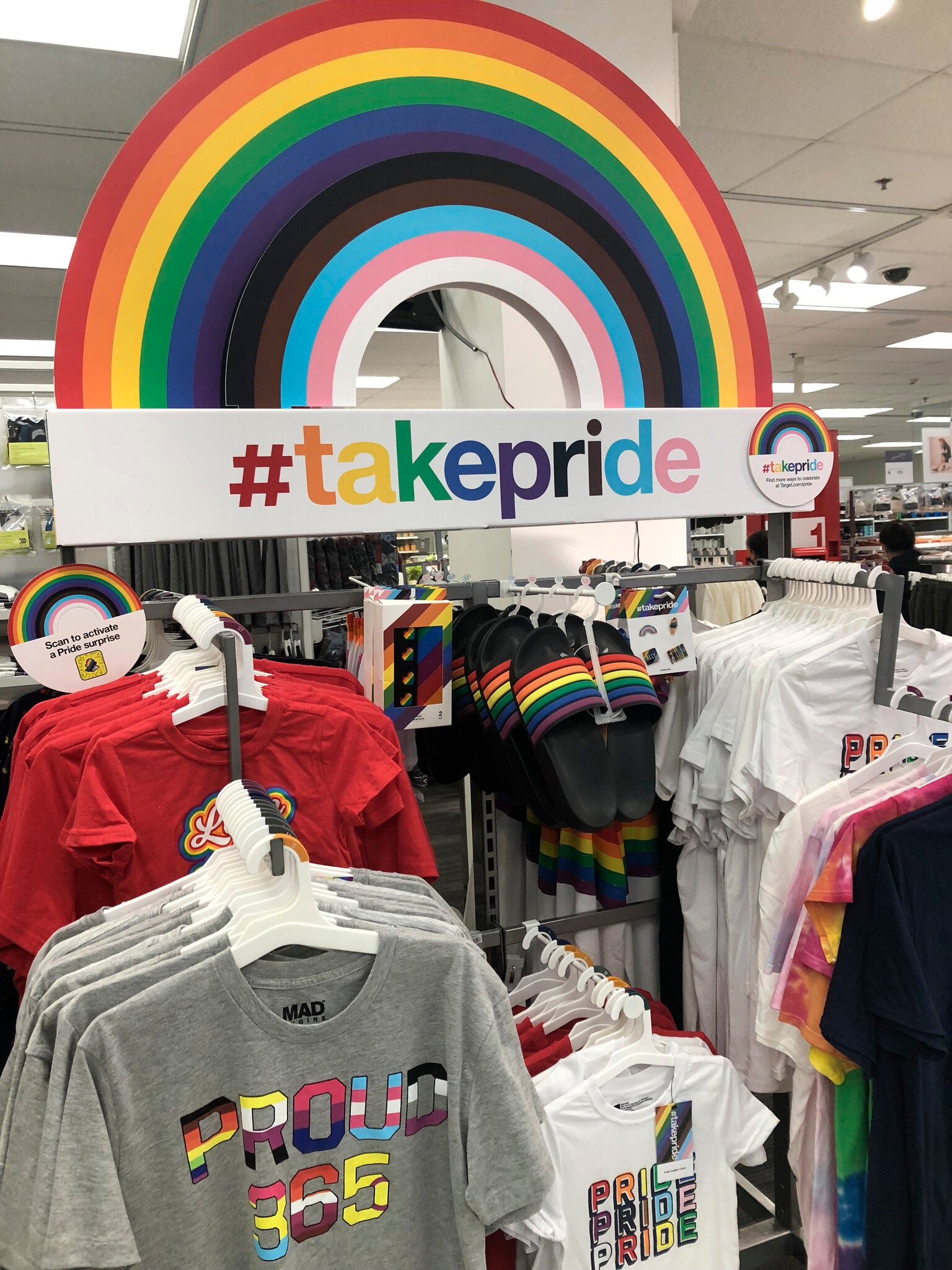Have you ever wondered about the merchandise sold by major retail chains? Well, it seems that even popular stores like Target can draw controversy with their product offerings. One such question that has sparked a lot of discussion is whether Target is selling Satan shirts. This unexpected twist in the retail world has left many people curious and concerned about the impact it may have on society.
When delving into the issue of Target selling Satan shirts, it is essential to consider its historical and cultural context. While there have been instances of controversial apparel in the past, it is crucial to separate fact from rumor. In recent years, it has become increasingly prevalent for companies to face backlash for selling items that go against religious beliefs or societal norms. Understanding the concerns behind such controversies is important for consumers to make informed decisions and for companies to ensure they align with their customers' values.
No, Target is not selling Satan shirts. Target is a reputable retail company that abides by strict ethical guidelines in the products they sell. They have a strong commitment to providing a diverse range of products that cater to different customer preferences, while maintaining a responsible and inclusive approach. As such, the sale of shirts with satanic imagery or references would not align with their values and brand image. Customers can trust that Target offers a wide selection of quality products that adhere to their high standards.

The Controversy Surrounding Target Selling Satan Shirts
Target, one of the largest retail chains in the United States, has recently come under scrutiny for allegedly selling Satan shirts. This controversial topic has sparked intense debate among consumers, religious groups, and the general public. The allegations raise questions about the boundaries of freedom of expression, religious sensitivity, and corporate responsibility.
Allegations and Public Outrage
It all started when a social media post went viral, accusing Target of selling shirts featuring satanic symbols and imagery. The post included photos of the alleged products, which quickly drew attention and sparked public outrage. Many individuals expressed their disbelief and disappointment, questioning how a reputable retailer like Target could endorse such controversial merchandise.
The allegations gained traction as the post was shared across various platforms, amplifying the public's concerns. Individuals who were appalled by the alleged presence of satanic shirts in Target stores voiced their outrage and called for a boycott of the company. Social media platforms became inundated with hashtags like #BoycottTarget, further fueling the controversy.
In response to the public outcry, Target issued a statement denying the allegations. The company stated that they do not carry any satanic merchandise in their stores and that the photos circulating online were either doctored or fabricated. Target emphasized their commitment to providing a safe and inclusive shopping environment for all customers, regardless of their religious beliefs.
However, despite the company's denial, the controversy continued to grow. Some consumers remained skeptical of Target's response, questioning the authenticity of the statement. The lack of conclusive evidence regarding the origin of the photos added to the confusion surrounding the issue.
Freedom of Expression and Religious Sensitivity
The controversy surrounding the alleged sale of Satan shirts brings to light a complex debate regarding freedom of expression and religious sensitivity. On one hand, supporters argue that individuals have the right to express their beliefs and wear clothing that reflects their personal values, no matter how controversial they may be.
Opponents, on the other hand, highlight the need for religious sensitivity and the responsibility of corporations to avoid endorsing or promoting symbols or imagery that may offend certain religious or cultural groups. They argue that retailers, like Target, have a duty to carefully curate their product offerings to ensure they uphold values that resonate with the majority of their customers.
As this controversy unfolds, it is important to navigate these discussions with respect and open-mindedness. Balancing freedom of expression with religious sensitivity requires constructive dialogue and an understanding of diverse perspectives.
Corporate Responsibility and Supply Chain Management
One aspect of the controversy revolves around corporate responsibility and supply chain management. If the allegations were true, it would raise concerns about the sourcing and vetting of products by Target. Customers expect retailers to thoroughly assess the products they sell, ensuring they meet ethical standards and align with the company's values.
Target has a responsibility to work closely with their suppliers and conduct rigorous quality control measures to prevent the circulation of potentially offensive or controversial merchandise. Companies must ensure transparency and accountability throughout their supply chains to avoid inadvertently promoting inappropriate or offensive products.
The controversy surrounding the alleged sale of Satan shirts serves as a reminder for retailers to review their supply chain protocols and strengthen their diligence in curating their product offerings, safeguarding against potential controversies and maintaining the trust of their customers.
The Impact on Target's Reputation and Future Actions
Amidst the controversy surrounding the alleged sale of Satan shirts, Target's reputation has been greatly impacted. The negative publicity and public outcry have led to calls for a boycott, potentially affecting the company's bottom line. Target now faces the challenge of rebuilding trust and restoring its image among its customer base.
In response to the allegations, Target has taken steps to investigate the issue further and reiterated their commitment to ensuring the safety and inclusivity of their stores. The company has vowed to strengthen their supply chain procedures and address any potential gaps that may have allowed controversial merchandise to be sold in their stores.
Moving forward, Target's actions will play a crucial role in determining the long-term impact of this controversy. It is imperative for the company to take swift and decisive measures to address customers' concerns, provide transparent communication, and regain their trust. Target must demonstrate its commitment to upholding values that align with the majority of its customer base and navigate future product selection with increased diligence.
Ultimately, whether or not Target was actually selling Satan shirts, this controversy raises important questions about corporate responsibility, freedom of expression, and religious sensitivity. The ongoing dialogue surrounding this issue serves as a reminder for companies to carefully evaluate their product offerings and supply chain management, ensuring they align with societal expectations and contribute to a safe and inclusive environment for all.

Is Target Selling Satanic-themed Shirts?
There have been recent claims circulating on social media suggesting that Target, a popular retail store, is selling shirts with satanic symbols. These reports have caused quite a stir among concerned individuals and religious communities.
It is important to note that as of now, there is no concrete evidence to support these allegations. While some individuals claim to have found shirts with satanic imagery in Target stores, it is essential to investigate the credibility of these claims and not jump to conclusions without substantial evidence.
Target has not released any official statement regarding these allegations.
It is crucial to approach such claims with skepticism and undertake thorough research before drawing any conclusions. It is also essential to respect the principles of freedom of expression and religious diversity within our society.
Key Takeaways
- Target is not selling Satan shirts.
- There have been rumors circulating about Target selling satanic merchandise.
- These rumors are false and have been debunked by Target.
- Target has a strict policy against selling offensive or controversial products.
- It is important to fact-check information before spreading rumors.
Frequently Asked Questions
Here are some common questions and answers regarding the sale of Satan shirts at Target.
1. Are there any Satan shirts being sold at Target?
No, Target is not selling any Satan shirts. Target is a family-friendly retail store that focuses on providing a wide range of products for their customers. They prioritize offering a diverse selection of merchandise that caters to various interests and preferences.
If you have seen or heard any claims about Target selling Satan shirts, it is important to be cautious of misinformation. False rumors and hoaxes can easily spread, so it's always best to verify information from reliable sources before drawing any conclusions.
2. Why do people spread rumors about Target selling Satan shirts?
Often, rumors about popular brands like Target arise from misunderstandings or deliberate attempts to create controversy. Some people may spread false information about Target selling Satan shirts for various reasons, such as seeking attention, promoting their own agenda, or simply enjoying stirring up controversy.
It's essential to remember that it is easy for false information to spread rapidly on social media and other platforms. Always verify facts before believing and sharing such claims to avoid contributing to the circulation of misleading information.
3. Can I trust the information I find online about Target selling Satan shirts?
While the internet can be a valuable source of information, it is crucial to exercise caution and critical thinking when consuming online content. Misinformation and fake news are prevalent online, and it's imperative to verify information from reliable sources.
When it comes to claims about Target selling Satan shirts, it is advisable to consult official statements from Target itself or trusted news outlets. These sources can provide accurate and up-to-date information to help you separate fact from fiction.
4. What steps does Target take to ensure the quality and appropriateness of their merchandise?
Target has a rigorous process in place to ensure the quality and appropriateness of the merchandise they offer. They have a team dedicated to sourcing products from trusted suppliers and manufacturers. These products undergo thorough inspections and assessments to meet Target's standards.
Their commitment to customer satisfaction includes regularly reviewing customer feedback and taking appropriate action if any concerns or issues arise regarding the products they sell. Target strives to provide a safe and enjoyable shopping experience for their customers.
5. How can I report any misinformation or false claims about Target selling Satan shirts?
If you come across any misinformation or false claims about Target selling Satan shirts, it is important to report them to the relevant platforms or authorities. Social media platforms often have reporting features that allow users to flag and report false information.
You can also reach out to Target directly through their customer service channels to inform them about any misleading information circulating about their brand. By reporting false claims, you can help prevent the spread of misinformation and maintain the integrity of accurate information.
In conclusion, there is no evidence to suggest that Target is selling Satan shirts. The rumor seems to have originated from a misunderstanding or misinterpretation of certain shirt designs available at the store. It is important not to jump to conclusions based on incomplete or misleading information.
Target is a reputable retailer that follows strict guidelines when selecting products for their shelves. They prioritize the safety and satisfaction of their customers, and would not knowingly sell offensive or controversial items. It is always a good idea to fact-check information before spreading rumors or making assumptions about a company's practices.

































